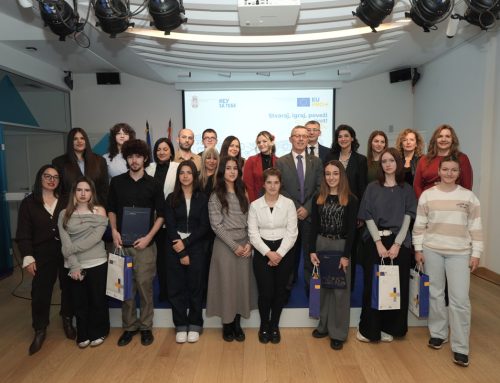There is no doubt Serbia has a Government fully committed to EU accession and achieving this goal as soon as possible, Head of the EU Delegation to Serbia Ambassador Michael Davenport said in an interview with FoNet, adding that European Commission stands ready to support Serbia in implementing all the necessary reforms.
Conducting the interview in Serbian language, Davenport said the recent visits by EU High Representative Catherine Ashton and Enlargement Commissioner Štefan Füle marked “an extremely positive start” for the EU accession process, a process that “defines key priorities for your country, “ given that the EU supports Serbian efforts to become one of its Member States.
Economic and structural reforms as described in the newly appointed Prime Minister’s programme presentation in the Parliament are at the top Serbia’s agenda, as well as rule of law and a comprehensive normalisation of Belgrade-Pristina relations, the Ambassador said.
Noting that Serbia has lately made significant progress in European integrations, Davenport said what is crucial now, are the preparations for the opening of chapters concerning rule of law, fundamental rights, fight against corruption and discrimination, and asylum seekers’ rights as well.
He considers the opening of chapters 23 and 24 possible at the beginning of next year “given that substantial progress regarding implementation of relevant strategies and action plans is visible already, at the very beginning of the new Government’s work”.
However, political will and new Government’s capacity to undertake radical reforms can be judged only by actions, Davenport said, adding that the new Government is “aware of the extent of tasks, whose accomplishing would lead to opening of the key chapters 23 and 24”.
Asked about fight against corruption, he said adopting a strategy and an action plan is “not enough,” pointing out that “unfortunately, work in this area is not going as planned”.
“If we really want to make significant progress visible, strategy should be implemented at full pace, because there are more major tasks ahead. This implies an approach that unifies not only the efforts of Government’s institutions, but also those made by institutions outside central Government – independent regulatory agencies and representatives of civil society,” said Davenport.
When it comes to justice, there are more challenges ahead, he said, adding that “judiciary efficiency is not satisfactory,” while “on the other hand, judicial independence also gives reasons for concern”.
Talking about economic and structural reforms, above all about reducing the budget deficit and fiscal consolidation, Davenport assessed that European Commission stands ready to support the new Government with specific support and assistance programmes.
Speaking about the issues regarding implementation of the Brussels agreement between Belgrade and Pristina, Davenport said that “it’s an ongoing process,” but that “there is a substantial progress regarding agreement’s implementation,” referring to recent local elections in Kosovo.
He said it was up to both sides to jointly define further priorities and specific goals, with the assistance of the EU, whereas a comprehensive normalisation of Belgrade-Pristina relations would be a common goal of all sides.



